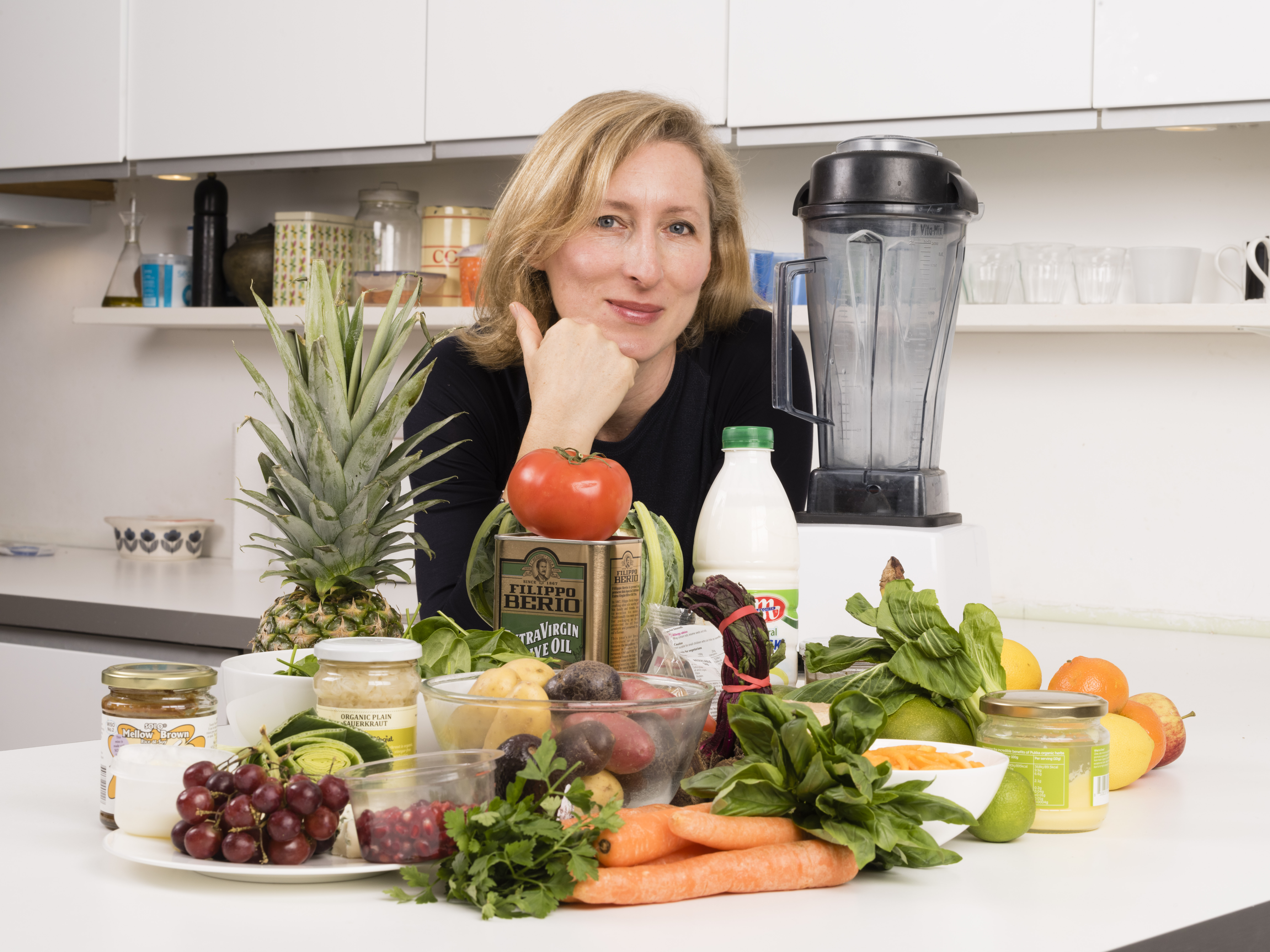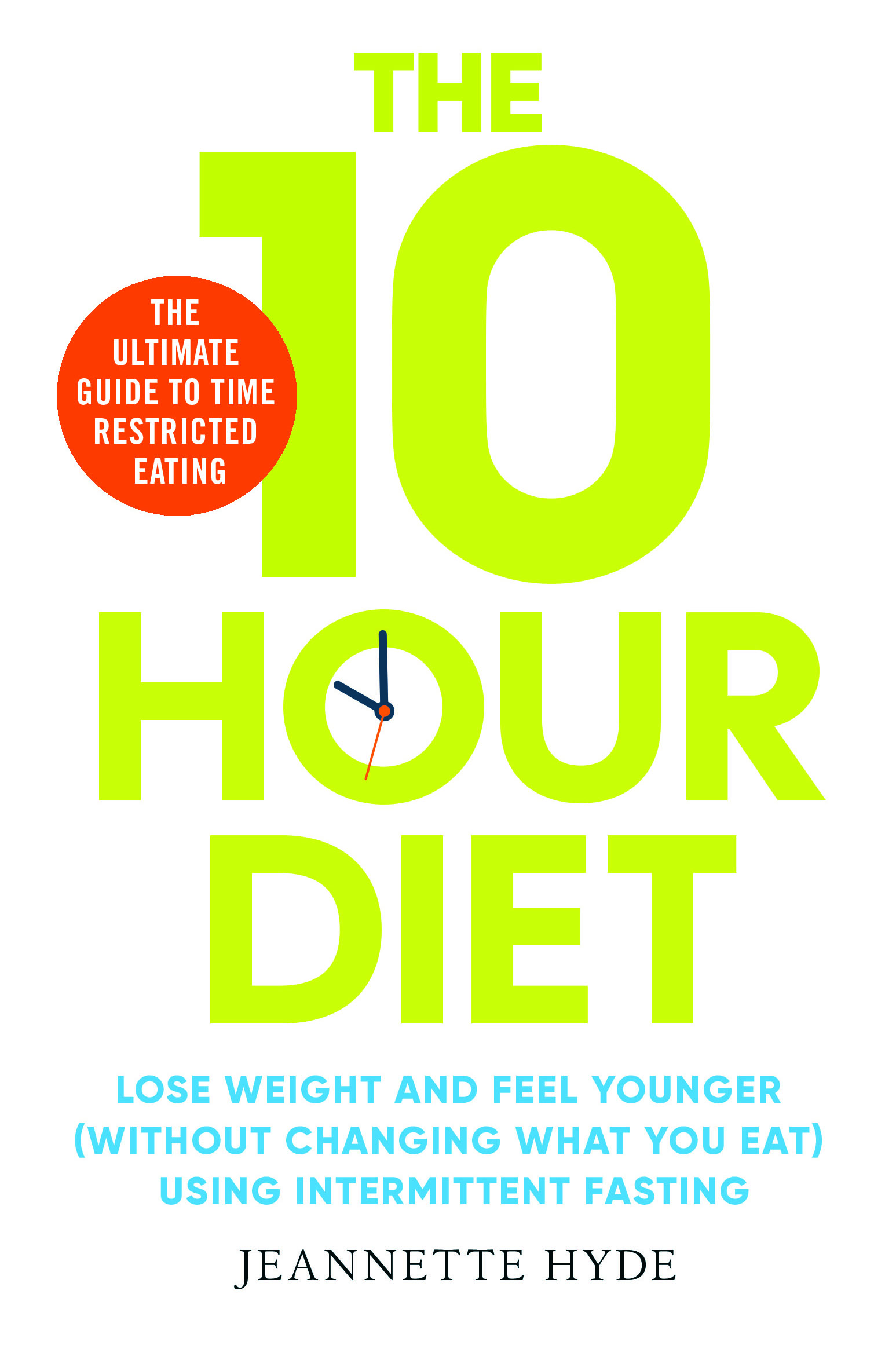Will you lose weight and be healthier if you eat in a 12, 10 or 8- hour window of time each day? That is the question that has gripped the health world over since time-restricted eating (TRE) mice studies sparked excitement in this area (1, 2, 3, 4, 5). The good news is there is now research on humans to go on.
This blog is written by guest writer and nutritional therapist, Jeannette Hyde. After experiencing burnout as a journalist on a national newspaper, Jeannette now works with individuals and groups online offering bespoke protocols and support plans.
Time-restricted eating is a style of intermittent fasting (IF), where you swing between feast and famine like our ancestors. Unlike other styles of IF where you alternate between low-calorie days and eating what you want on other days of the week, TRE involves no calorie counting or hangriness (getting hungry and angry). You simply eat your normal diet in a set time slot each day and have a long overnight fast, much of which you’ll be asleep anyway.
The most popular TRE styles in the 24-hour clock are these:
- 8:16 (where you eat in an 8-hour slot and fast for 16 overnight)
- 10:14 (where you eat in a 10-hour slot and fast for 14 overnight)
- 12:12 (where you eat in a 12-hour slot and fast for 12 hours overnight)
My new book The 10 Hour Diet is the result of looking at studies in this area, and concluding that the latest research shows us that the 10:14 is probably the most effective and practical option for us humans.
Eating in a 10-hour daytime window (either 8am-6pm or 10am-8pm), followed by a 14-hour fast results on average in about half a stone/7 pounds/3.5kg over three months weight loss with no change to the content of diet (6, 7) probably because:
- Food from your last meal has been digested and absorbed. Stored glycogen sugar in your liver, has been used up too. This means the body starts breaking down fat for energy to fuel your organs during your sleep and power you along in the morning till you have breakfast.
- The body burns more fuel from food eaten earlier in the day than later – you have more time to burn the energy eaten as you go about your day, the thermogenic effect.
- Fasting can reset your hunger hormones (leptin and ghrelin), so you start to be able to recognise when you are hungry and full more easily and this leads to less over-eating.
- In studies, people generally consumed around 20 per cent less calories a day, without counting calories. This was because after they finished their 10-hour eating window (either at 6pm or 8pm) they automatically dropped the habit of snacking and alcohol on the sofa.
So you may be wondering if a longer fast better would mean more weight loss? Eg 16-hours of fasting and eating in an 8-hour window – doesn’t logic dictate that would results in more weight loss? The science says not necessarily so…
A Korean cross-sectional study (8) showed that men eating after 9pm, and doing long overnight fasts (more than 12 hours), and having less than 6 hours sleep, were more likely to be overweight, diabetic and have heart disease. The authors concluded that frontloading meals earlier in the day and having a quality sleep schedule and not eating after 9pm may help weight and metabolic health.
A randomised control study last year (9), where subjects fasted for 16 hours overnight and ate in an eight-hour window noon till 8pm, for three months, didn’t lose significantly more weight than subjects eating three meals a day when they wanted. The TRE group worryingly lost muscle mass. The authors concluded that the loss in lean muscle was probably because subjects ate less protein. One presumes that if they weren’t opening their eating window till noon, they were skipping breakfast which for many contains eggs which are rich in protein.
In my clinical practice I have come across people who when we first meet are frustrated and say that they aren’t experiencing weight loss from TRE. They have usually been trying to eat in an 8-hour window and can’t see the results they expected. Many (natural non-breakfast fans) can go all morning without eating or feeling hungry, and some even forget to start eating till 2pm or so. They then close the eating window at around 10pm with a glass of wine in front of the 10 o’clock news. This means they aren’t burning those late night calories going about their day, the digestive system strains to digest it, and hunger hormones aren’t getting the circadian clock reset that earlier day eating can give. Also the evening is when socially people are most likely to drink calorie-loaded alcohol.
Conclusion: the sweet spot in humans probably lies between the 12th and 14th hour of fasting without putting too much stress on the body. More importantly than the length of your overnight fast, the timing of your last morsel of food needs to be early (10), somewhere between 6pm and latest 8pm to work. You also need to prioritise quality sleep to lose weight from overnight fasting.
Key takeaways:
To lose weight over three months through this gentle method – eating in a 10-hour time slot and fasting for 14:
- Eat either between 8am and finish eating by 6pm or between 10am and 8pm.
- Prioritise quality sleep.
- Remember to include protein in your meals.
Jeannette Hyde
 Jeannette Hyde is Registered Nutritional Therapist with a special interest in gut health, working with clients online one-to-one and in groups. She also runs health retreats abroad, and is a regular commentator on nutrition on the BBC and in print and online media. She has a BSc in Nutritional Therapy from Westminster University.
Jeannette Hyde is Registered Nutritional Therapist with a special interest in gut health, working with clients online one-to-one and in groups. She also runs health retreats abroad, and is a regular commentator on nutrition on the BBC and in print and online media. She has a BSc in Nutritional Therapy from Westminster University.

Jeannette’s new book, The 10 Hour Diet can be ordered here and costs £8.99. It is published by Simon & Schuster on 21 January 2020.
You can receive more food and lifestyle tips on Jeannette’s Instagram @jeannettehyde or sign up to her newsletter at www.jeannettehyde.com to receive regular information on nutrition-related topics.
With many thanks to Jeannette for this blog. If you have any questions regarding the health topics that have been raised, please don’t hesitate to get in touch with Amanda via e-mail or phone:
amanda@cytoplan.co.uk
01684 310099
Amanda Williams and the Cytoplan Editorial Team
References
- Hatori et al., ‘Time-restricted feeding without reducing caloric intake prevents metabolic diseases in mice fed a high-fat diet’, Cell Metabolism, Vol. 15 (2012): 848–860.
- Zarrinpar, A.; Chaix, A.; Yooseph, S.; Panda, S. Diet and feeding pattern affect the diurnal dynamics of the gut microbiome. Cell Metab. 2014, 20, 1006–1017, doi:10.1016/j.cmet.2014.11.008.
- Chaix, A.; Zarrinpar, A.; Miu, P.; Panda, S. Time-restricted feeding is a preventative and therapeutic intervention against diverse nutritional challenges. Cell Metab. 2014, 20, 991–1005, doi:10.1016/j.cmet.2014.11.001.
- Zarrinpar, A., Chaix, A., Panda, S., ‘Daily eating patterns and their impact on health and disease’, Trends Endocrinol Metab (2015). doi: 10.1016/j.tem.2015.11.007
- Wilkinson et al., ‘Ten-hour time-restricted eating reduces weight, blood pressure, and atherogenic lipids in patients with metabolic syndrome’, Cell Metabolism (2020). doi: 10.1016/j.cmet.2019.11.004
- Chow et al., ‘Time-restricted eating effects on body composition and metabolic measures in humans with overweight: a feasibility study’, Obesity (2020). https://doi. org/10.1002/oby.22756
- Anton, S., et al., ‘Flipping the metabolic switch: understanding and applying health benefits of fasting’, Obesity (2018). doi: 10.1002/oby.22065
- Ha and Song. ‘Associations of meal timing and frequency with obesity and metabolic syndrome among Korean adults’, Nutrients (2019). doi: 10.3390/nu11102437
- Dylan A. Lowe et al (2020). Effects of time-restricted eating on weight loss and other metabolic parameters in women and men with overweight and obesity
The TREAT Randomized Clinical Trial. JAMA Internal Medicine. doi:1001/jamainternmed.2020.4153 - McHill et al., ‘Later circadian timing of food intake is associated with increased body fat’, American Journal of Clinical Nutrition (2017). doi: 10.3945/ajcn.117.161588
Last updated on 29th January 2021 by cytoffice



Hi, this article is very interesting and much needed. I am wondering though if any of the studies were conducted on women?
Hi Jory – The studies were conducted on mixed groups of men and women eg the Wilkinson study. Thanks, Jo
This has come at the perfect time for me! Extremely interesting as I’m just into day 3 of a 16:8 fasting, high protein, low carb diet for a month to kick start some weight loss. Thankfully I’m the latter person you described, can normally not feel hungry until mid afternoon and eat after then. However, your points about finishing eating at 6pm or 8pm make total sense. I’m one of those 10pm eating in front of the TV 🙁 so have been trying to stop eating at 8pm but having a strong tasting herbal tea at 10pm… is this OK, as its zero calories? I’m trying to incorporate a balance, otherwise I’ll easily go back to old habits after, and really don’t want that! Many thanks
Hi Dee – thank you for your comment. We’re so pleased to hear you enjoyed this article. Herbal tea no calories is fine, the non fruit teas tend to fit this bill. Thanks, Jo
what about the diurnal cortisol rhythm? wouldn’t be better to consider when to start the eating window in relation to that? thank you
Hi Antonia,
Thank you for your comment. For sleep circumstances it is best not to eat 3 hours before going to bed as insulin can inhibit melatonin production, and hence interfere with he circadian rhythm, this is also the time when cortisol starts to decline. Therefore if you go to bed at 10pm, it is best to finish eating at 7pm, this fits into declining cortisol and increasing melatonin. Therefore the 8-6 or a 9am-7pm window fits well into this. 7/8am is also a time when cortisol begins to increase again. As this is not skipping breakfast it fits well into the circadian rhythm and shouldn’t, see the peak in cortisol that you see in breakfast skippers.
Thanks,
Amanda
What would be recommended for type 1 diabetic in this system where it is advised to eat 3 times daily to support insulin intake
Hi Yvonne,
I am afraid that due to legislative restrictions for nutritional therapists, we are unable to advise for people with type 1 diabetes – but you could discuss this with your Doctor. So sorry we can’t be more help at this stage.
Thanks,
Amanda
I found this article really helpful. Thank you
I’m really interested in trying this but one of my problems is dry mouth syndrome due to medications, so I need to chew gum outside the ten hour period and also suck sweets made from xylitol during the night. Any suggestions I could substitute, please?
Hi Nann – I do not know of any completely free alternatives to chewing gum etc. You would need to have reduced calories as much as possible but the sweetness of xylitol can also cause the release of insulin. You could try chewing ginger or liquorice which will have minimal calories or jut drink water. Thanks, Helen
A very interesting and thought provoking article. Fortunately, it served to confirm that what I have been doing all these years was the correct approach. Many thanks.
Interesting, but I would suggest that there are too many variables in your cited references to make any valid scientific claims.
Thank you for your comment. There are always high amount of variable in nutrition studies, due to the nature of nutrition/food consumption and lives of people involved. And the evidence is always evolving. The focus is to utilise interventions which have potential to support health over writing a scientific paper. The single substance approach of randomised controlled trails is limited in efficacy for producing interventions for conditions (particularly when chronic) as the determinants of illness and health are by definition complex and impacted by a multiplicity of both extrinsic and intrinsic factors.
Hello Jeannette, thanks for the interesting article on timing for eating. You mention that after about three months of the 8/10 slot that its possible to lose around half a stone. If I kept to that after the three months, would I continue to lose weight and would my body then find its own balance for what my weight should be? Many thanks, Eileen
Hi Eileen – Many thanks for your email. Yes it is safe to continue with Tie restricted Eating over the long term. Also often when people stop they can regain weight so best to continue as much as possible. When you have achieve target weight you could be more relaxed and opt for 12:12. Thanks, Helen
Love studies on TRE and welcome more. I find this article flawed though. Apologies to the author. It compares TRE plans and bases the results on the 8:16 not being the best as it misses breakfast and has dinner too late. The 8:16 study quoted was one where people didn’t eat breakfast and ate from 12 – 8. What if you ate from 8am until 4pm as I do? Then it removes the issues with not having breakfast and eating dinner too late. You can’t test the effectiveness of the different TRE plans and solely base the results on the fact 16 hour fasts are bad as you miss breakfast. I don’t miss breakfast, am lucky I can eat my dinner very early (I realise not for everyone) and find this works well for me. I go to bed early and like to eat a good few hours before I do. Perhaps a consensus can’t be reached until different forms are tested? All I can take from this article is it’s best to eat breakfast. Better to say that, than make a blanket statement that 8:16 doesn’t work as well as 10:14. My opinion anyway! Thanks!
Thank you for your comment. I understand your view. The main benefit of the 10:14 is that for many people it is easier to manage and therefore adhere to for a long period of time. But agree it is difficult to compare like for like.
I have been eating in a 8 hour window for over thirty years now. I eat a very healthy breakfast at about 9am with protein, salad and homemade sourdough made with wholemeal flour, and bowl of fruit. At about 5pm (sometimes earlier) I have dinner of protein vegetables and a homemade pudding of some sort, my one weakness, I don’t drink alcohol. I started eating like this as it meant I could get by on two meals a day. I have to admit though my portion sizes are biggish. I have nothing but perhaps some water until morning. My weight has stayed the same for all those years. 9 stone 8 and 5ft 5 inches tall.